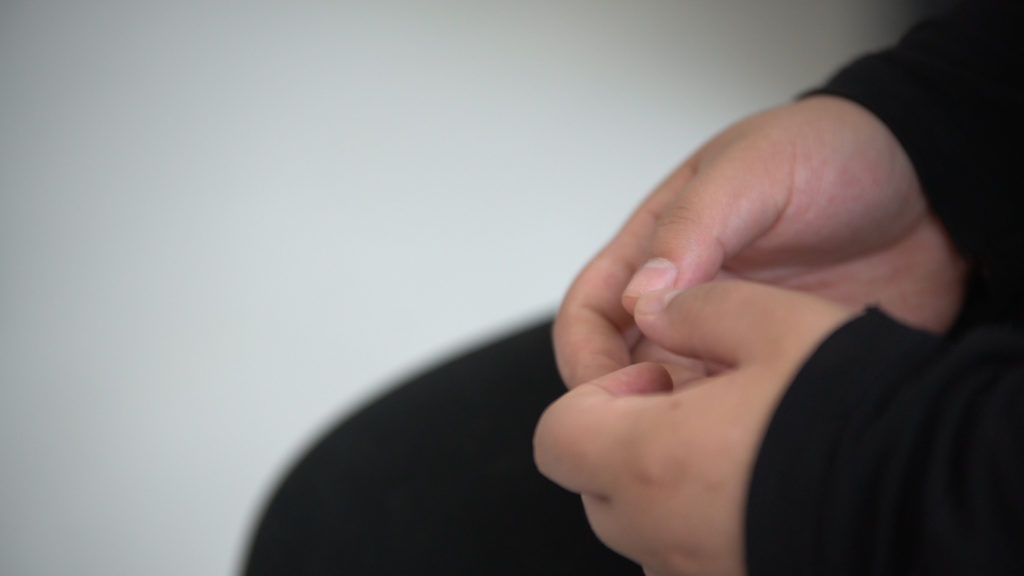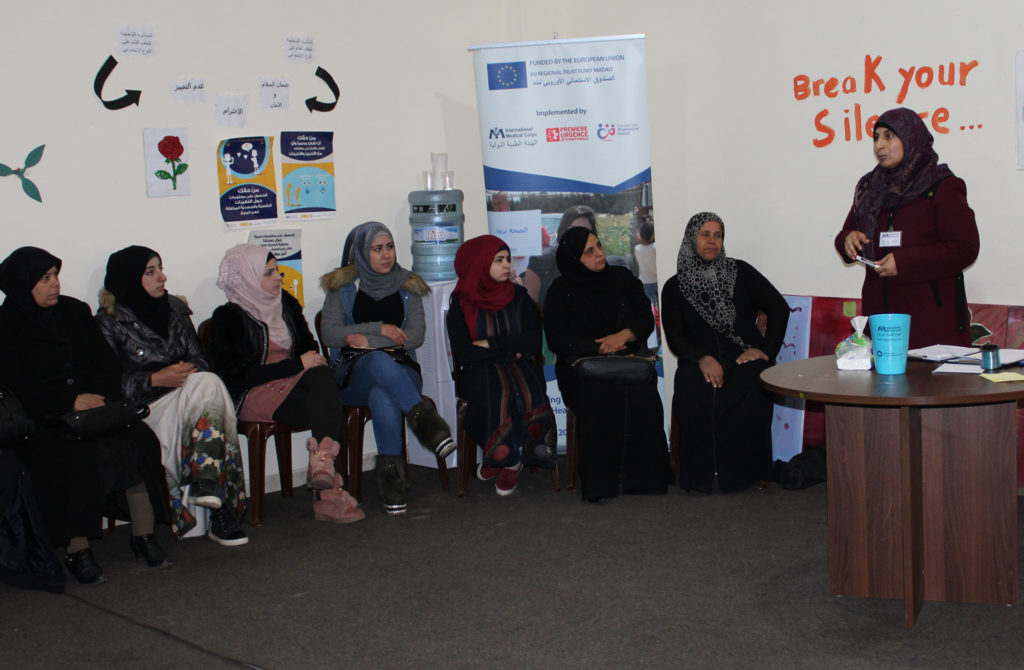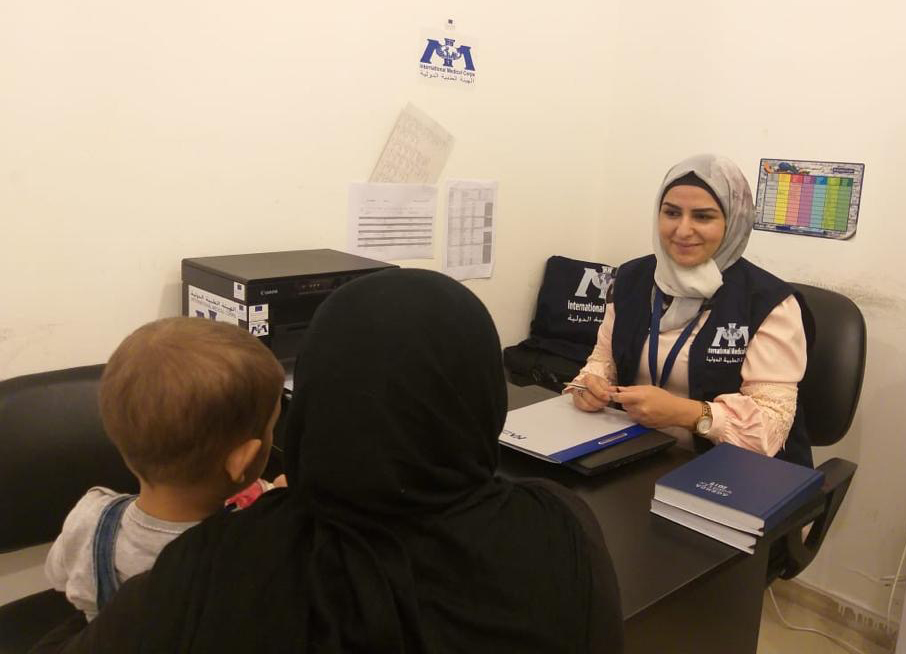“I want to name her Joury [rose], after my favorite flower. Hopefully, her days will be rosier than mine.”
This is what Rania* told the doctor when she delivered her third daughter and was asked to name her. Rania is a 33-year-old displaced Syrian residing in a small town in Southern Lebanon. She has three children: a 5-year-old girl, a 3-year-old boy and a 1-year-old girl. Rania looks after her children by herself, since her husband left them about a year ago.
Like many other Syrians, Rania, was forced to flee her war-torn country for her safety. Eight years on, the war in Syria has claimed hundreds of thousands of civilian lives, forced several million people from their homes and reduced many cities into rubble.
Talking to a visitor, Rania recalls a time a few days before she fled Syria. That day, there had been intense shelling. Not knowing what to do, she and her sister-in-law decided to run. A few kilometers outside their village, a car stopped for them and the three men inside told them that they would take them to safety.

They lied. Instead, they took the women to an abandoned house and raped them repeatedly. As soon as they had the chance to run away, Rania and her sister-in-law took it. They got back to their village, having made a pact to never tell a soul about what happened—if they did, they would both be killed by the men in their family. Rania explains, “We were raped. We brought shame to our family.”
However, after Rania fled alone to Lebanon, her sister-in-law, who stayed behind, broke the pact and told Rania’s father. He called Rania in Lebanon and gave her two choices: “death or marriage.” She was disowned by her family, and her mother—who was already residing in Lebanon—made her marry a man who was already married. She was now his second wife. But Rania tried to stay positive. She was alive, after all.
Life with her husband was difficult. He was neglectful and didn’t provide financially for the family. He didn’t work—not due to lack of opportunities, but rather a lack of will. Soon after Rania married her husband, he divorced his first wife. Then, about a year ago, he left her and her children, telling her that he would go back to Syria, devise an escape plan to Turkey and from there to Europe, and come back and take them when everything was in order.
She has yet to hear from him. Rania says, “I don’t think he is coming back. He never held a job and wasn’t involved. He got bored with our life, told me a lie and simply left.” She continues, while breastfeeding her daughter, with resignation in her voice. “It’s not like I am waiting for him or anything.”
Rania and her children were left to fend for themselves. If it weren’t for a woman in the southern Lebanese town where she lived who offered her a room to stay, free of charge, they would have been forced to sleep on the street. Rania currently survives on the goodwill of others. Some people bring her food from time to time; others donate their children’s old clothes. She often is forced to borrow money from people, adding to her debt.
Rania has tried to work, finding opportunities during olive picking season and working as a house cleaner. However, with three children and no family around, she hasn’t been able to keep a long-term job.
As a displaced Syrian in Lebanon, Rania received temporary humanitarian aid, in the form of food coupons and housing aid, but she says those stopped and no one would tell her why. Rania also currently receives psychosocial and gender-based violence case-management support from a different humanitarian agency.
Earlier this year, Rania reached a breaking point. She could no longer stand to feel this helpless and powerless, so one day, she decided to take her children to the beach. They weren’t going to swim or have a fun family day out—instead, Rania took them there because she had decided that drowning as a family was better than living. But, as if by an act of divine intervention, on her way to the beach, Rania received a phone call from the psychosocial case manager who’d been following her case. The case manager talked her out of what she was about to do—and Rania took her kids back home.
The case manager immediately referred her to International Medical Corps’ mental health and psychosocial support (MHPSS) team in the south of Lebanon. The case manager coordinated with the team specialists—a psychotherapist and a psychiatrist based in a primary healthcare center, where services are integrated to strengthen accessibility of services in a less stigmatized manner—to ensure a holistic approach, and developed a care plan with the client. Additionally, Rania was prescribed psychotropic medications to treat her symptoms of depression. “Talking to the case manager regularly really helped put things in perspective for me,” she says. “The medication also helped me better manage my stress and worries.”
Rania has been seeing the MHPSS team for several months now, and though her financial situation hasn’t yet improved, her state of mind has. International Medical Corps’ case management team followed up closely with her to provide intensive mental health and psychosocial support—including counseling, psychoeducation and development of a safety plan—should she have future thoughts of harming herself or her children.
The MHPSS team’s client-centered approach has enabled Rania to achieve her goals. Throughout the different phases of the intervention, Rania has showed a lot of improvement. She doesn’t have suicidal thoughts anymore; she is able to take better care of her children, and doesn’t cry as much in front of them anymore. She feels stronger now. She has been able to establish a great rapport with International Medical Corps’ mental health team, including a new case manager. “I can just talk to her about anything and everything,” she explains. “She is very supportive and kind to me.”

Despite all her challenges, Rania remains hopeful. She hopes to go back to Syria one day and build a modest home for her children, and has big dreams for them—she hopes they will be able to go to school, get an education and have a better life. In other words, she hopes that their days will be rosier than hers.
The mental health program described in this story is part of a project called Reducing Economic Barriers to Accessing Health Services in Lebanon (REBAHS), funded by the European Regional Trust Fund in response to the Syrian crisis, knows as the EU “Madad” Fund. It is implemented by a consortium led by International Medical Corps, in partnership with Première Urgence–Aide Médicale Internationale Lebanon and Fundación Promoción Social.
*The name of the subject of this story has been changed for their protection.
